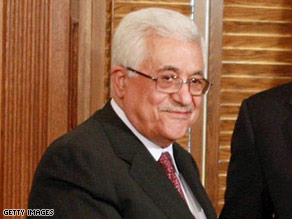
The elusive search for a Middle East peace will be center stage Thursday as President Obama sits down with Palestinian Authority President Mahmoud Abbas.
The afternoon White House meeting comes one week after Obama met with Israeli Prime Minister Benjamin Netanyahu and pressed the Israeli leader to halt West Bank settlement activity to create a better atmosphere for peace talks. It also comes only days before Obama is scheduled to meet with Saudi King Abdullah in Riyadh and deliver a long-awaited speech on relations between the United States and the Muslim world in Cairo, Egypt. During his meeting with Netanyahu, Obama pushed for a firm Israeli commitment to Palestinian statehood as part of the so-called two-state solution, a position strongly advocated by Abbas. Netanyahu has committed to removing illegal settlement “outposts” but has also pledged to continue expansion, or “natural growth,” of existing settlements. At the same time, he has refrained from endorsing Palestinian statehood, arguing that Israel first needs security guarantees and a clear Palestinian partner for peace talks.
Don’t Miss
Israel removes illegal settler outpost on West Bank
Analysis: Obama’s tough-love approach to Israel
Obama, Netanyahu discuss U.S.-Israeli disagreements
On Wednesday, Secretary of State Hillary Clinton reiterated the call for a complete halt to Israel’s settlement activity. “The president was very clear when Prime Minister Netanyahu was here, he wants to see a stop to settlements,” Clinton said after a meeting with Egyptian Foreign Minister Ahmed Ali Aboul Gheit. “Not some settlements, not outposts, not natural growth exceptions. That is our position. That is what we have communicated very clearly not only to the Israelis but to the Palestinians and others, and we intend to press that point.” A total of 295,000 Israelis live in the West Bank, according to the Council for Peace and Security Talks. Another 194,000 live in the disputed area of East Jerusalem. Abbas’ meeting with Obama comes at what many observers believe is a pivotal time in the Middle East peace process. “There is a critical window of opportunity, and it would be sensible for us to pass through it,” former British Prime Minister Tony Blair told members of the Senate Foreign Relations Committee two weeks ago. Blair has served as the United Nations’ primary Middle East envoy since stepping down as Britain’s prime minister in 2007. “We have a new [United States] administration that has come in and from the outset has said, ‘This is a priority for us,’ ” he said. “You have the Arab peace initiative, which signals that the Arab world is prepared to recognize Israel and to be part of this process. You have a basically unified international community position” in favor of a two-state solution. “If we cannot move this forward now, I think the risk is, there will be many people within Israel and within the Palestinian territories who will conclude it can’t be moved forward.” But without proper security, a Palestinian state will continue to be viewed as a threat rather than an opportunity for Israelis, Blair argued. At the same time, many observers say, the Palestinians need greater economic opportunity and more complete control over their territory. The struggle to balance Palestinian sovereignty and Israeli security was highlighted earlier Thursday, when Israeli anti-terrorism forces killed a suspected Hamas military leader in a West Bank village south of Hebron. Israel accused 45-year-old Aded El Majid Dodeen of, among other things, involvement in suicide bombings on buses in Jerusalem. Hamas, a militant Palestinian Islamist movement, controls Gaza but has limited sway in the West Bank, which is run by its secular rival Fatah.